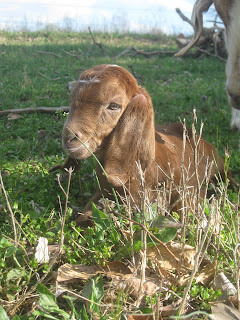Disclaimer: We love goats!
We have been raising goats for the last 3 years now and love, love, love our goats. As farm animals go, they are personable and fun loving. Their size makes them manageable for just about any farmer, with a land requirement that is lower too! But most importantly, with the right market, they pay for themselves with some profit left over.
Getting into goats was my idea. I wanted an animal I could handle and one that enjoyed being handled. While some are more personable than others, many will eat kitchen scraps right out of my hand. In the spring the kids romp and prance and play. Their tricks are great entertainment as they leap onto their mother's backs in attempts to create a living goat tower.
Land Requirements For Goats
Land requirements are lower for goats than cattle and they thrive on weeds and brambles. They are wonderful for taming abandoned pastures or dense overgrowth with their enormous appetites. We stock three nannies to the acre but with more intensive management, one could stock up to seven to the acre. There are still other plans, like intensive rotational grazing or confinement raising that allow even higher stocking rates.Pasturing goats is relatively simple because they pick their own food. This means there is less feeding labor than confinement raising. But parasites seem to be the largest limiting factor for stocking rates on pasture. With more manure in the field, there are more parasites. Stocking rates must align with with the parasite resistance rates of the goats. The more resistant to parasites a goat is, the fewer eggs they will drop on a field and the better they can cope with the parasite pressures of the field. This is especially important in July and August when parasites are at their strongest.
Certain breeds are more resistant than others. Kikos, a meat goat, are known for their resistance to parasites. Mixed breeds with hybrid vigor also seem to do well. Boers, originating from dry Africa, are known to be highly susceptible to worms.
Kids born later than March, in our neck of the woods, seem to be plagued with parasite troubles. Goats do not develop resistance to worms until about 4 months of age. If our kids struggle when they are young they seem to invariably struggle the rest of their lives.
Goat Farming Can Be Profitable!
Goats are also prolific! We have had two sets of quads and many, many sets of triplets and twins. When we started we had eleven goats. Today there are over 30 nannies and one buck outside my window. Two months ago we kidded out 25 new kids with another group to hit the ground next month.
Which brings me to my final point. Goats can be an income source. Though it no doubt depends on many factors, we put in the bank about 100% more than what we spend on these cute critters. It is not a huge income source for us but serious goat growers who direct market can make a lot more than we do. Tune into to this series to learn more about the work that goes into goats and the satisfaction, enjoyment, and income that comes out.



No comments:
Post a Comment